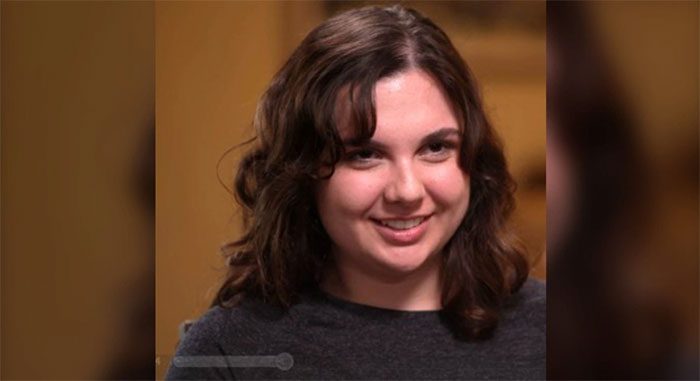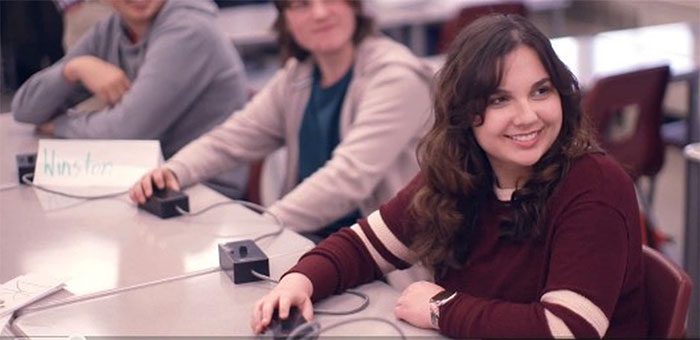Just mention any day in the past, and a person with extraordinary memory can recount what happened on that day.
Memory of Everything

Emily Nash, a person recently diagnosed with “hyperthymesia” – (Photo: CTV W5).
Emily Nash (18 years old) from Ottawa, Canada, has just been recognized as one of the youngest people in the world with hyperthymesia, also known as “Highly Superior Autobiographical Memory” (HSAM). Emily is the first Canadian to be documented with HSAM.
For most people, memories fade over time. If someone asks you to recall what happened on a past date, you would likely need some time to think back.
However, if asked, Emily can respond accurately within seconds. For example, on October 21, 2021, Emily immediately remembers the on-set shooting incident involving Alec Baldwin. She is certain it was a Thursday.
What about March 4, 2019? Emily recalls the day actor Luke Perry passed away. She shares that during lunch that day, while her mother was driving her home, the radio announced the news.
Emily describes her memory as a video calendar right in her brain. “Each day represents a little movie that I can rewind to different moments,” Emily explains.
Emily’s family discovered her unusual memory ability when she was young. Her father, Jason Nash, recounts that just by showing Emily a series of colorful bowling balls for 10 seconds, she could accurately recall their colors and the order they appeared in.
Her mother, Julie Farnworth, remembers when Emily was 5 years old; after watching a cartoon, she could repeat any dialogue between the characters.

Emily participating in surveys with Northwestern University and Texas State University – (Photo: CTV W5)
At 18, Emily was tested by scientists at Northwestern University in Chicago and Texas State University. They provided her with a list of random dates and asked her to recount her experiences from those days. As a result, Emily was 100% accurate.
The research team confirmed that Emily has “highly superior autobiographical memory” (HSAM). Currently, there are about 100 – 200 documented cases of HSAM worldwide. “Now I feel like I’m not alone,” Emily stated.
Searching for Answers on Extraordinary Memory
Scientists only began studying HSAM in 2006. Research has established that the memory abilities of these individuals are completely unrelated to IQ and differ from “super memory” developed through practice or tricks.
Individuals with HSAM simply have an exceptional ability to remember. For those with HSAM, their memories do not fade over time as they do for most people.
“It can be understood that they are not trying to remember; they simply do not forget,” said psychologist Carmen Westerberg from Texas State University.
She further noted that the extraordinary memory of individuals with HSAM primarily involves recalling real-life experiences they have gone through. While they may have vivid mental diaries, they can also suffer from negative emotions when they cannot forget things they wish to.

Memories are always vivid for those with HSAM – (Photo: NEW SCIENTIST).
For example, they may constantly remember a negative event that occurred in their past, while an average person might gradually forget over time. This is why many individuals with HSAM also experience obsessive-compulsive disorder (OCD).
The research team from Northwestern University attached sensors to Emily’s head and chest to study her sleep. Emily participated in a project comparing the sleep patterns of 12 adults with HSAM to 24 normal individuals.
After analyzing the brainwave charts, the team found that those with HSAM typically recorded double the number of sleepiness episodes compared to those with normal memory.
They also exhibited unusual slow-wave sleep patterns during the initial sleep stages. This may explain why their memories of daily events are reinforced more strongly.
The team’s research is nearing completion and will be fully published by the end of 2024.

Many individuals with HSAM also experience psychological disorders when they cannot forget memories they wish to – (Photo: ALAMY)
Although there are only about 100 – 200 confirmed cases of HSAM worldwide, some scientists suspect that there are many more cases that remain unknown. Psychology Professor Valerio Santangelo from the University of Perugia calculated that theoretically, 0.01% of the world population has HSAM, which equates to about 700,000 people. Most of them have not undergone official testing. |




















































